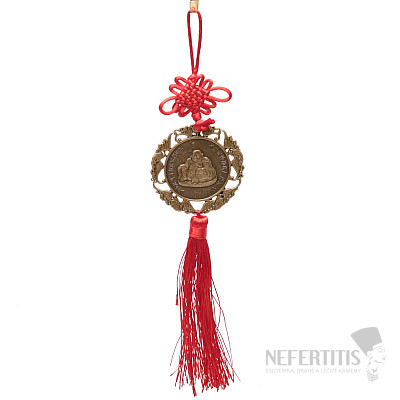Feng Shui protective curtain Happy Buddha for happiness and prosperity
Feng Shui protective curtain Happy Buddha for happiness and prosperity
Feng Shui traditional protective curtain Happy Buddha for happiness and prosperity, with a traditional knot and tassel against fear, negativity and to promote stability, suitable for cars, homes, offices. Hinge length… more »
Buy and get shipping for 5 €
view shipping options
| Parcel service DE [EN] | 5.50 € | |
| Parcel service LT [EN] | 7.40 € | |
| Parcel service LU [EN] | 5.60 € | |
| Parcel service LV [EN] | 7.40 € | |
| Parcel service NL [EN] | 5.80 € | |
| Parcel service PL [EN] | 5 € | |
| Parcel service PT [EN] | 10.60 € | |
| Parcel service RO [EN] | 7.30 € | |
| Parcel service SE [EN] | 9.30 € | |
| Parcel service SI [EN] | 7.50 € | |
| Parcel service IT [EN] | 9.10 € | |
| Parcel service IE [EN] | 12.60 € | |
| Parcel service AT [EN] | 5.50 € | |
| Parcel service BE [EN] | 5.80 € | |
| Parcel service BG [EN] | 13 € | |
| Parcel service EE [EN] | 7.50 € | |
| Parcel service ES [EN] | 10.40 € | |
| Parcel service FI [EN] | 12.70 € | |
| Parcel service FR [EN] | 8.90 € | |
| Parcel service HR [EN] | 6 € | |
| Parcel service HU [EN] | 5.10 € | |
| Parcel service DK [EN] | 5.90 € |
Feng Shui protective curtain Happy Buddha for happiness and prosperity
Feng Shui traditional protective curtain Happy Buddha for happiness and prosperity, with a traditional knot and tassel against fear, negativity and to promote stability, suitable for cars, homes, offices. Hinge length approx. 28 cm. Illustrative illustration.
These curtains are often hung on door handles, in the hallway or in the entrance area. They are supposed to radiate an atmosphere of happiness and abundance, so that the wealth of the inhabitants and guests grows. Inner satisfaction leads to harmonious and peaceful coexistence in the house.
Buddha for happiness and prosperity. Ho Tai, as it is called in Chinese, is often confused with historical Buddha. Ho Tai is not a Buddha, but a revered Chinese monk. Ho Tai was famous for his Buddhist sermons and a bag full of presents he brought to children to reward them for learning about the Dharma. Behind this strange figure of Buddhism is a real historical figure. This is a Chinese Buddhist monk Chci Chi, Japanese Keishi. This Bodhisattva is known by the nickname Putaj (Pu-taj), which he obtained from a canvas bag with which he traveled throughout the country. So in China it is known as Pu-tai or Budai, in Japan Hotei or Hotai and in Vietnam as Bo Dai.
Ho Tai is often depicted in various forms, either with his hands over his head facing the sky, or he often holds a bag or has it over his shoulder. But no matter what he is portrayed with, he always has a happy, laughing face.
The Happy Buddha is often (but not always) depicted with one or more of the following characteristics:
1. big belly
2. bald head
3rd coat revealing chest
4. A wide distinctive smile
5. big bag
6th bowl, a traditional symbol that signifies wealth in Buddhism.
Ho Tai is a symbol of joy, happiness, prosperity and wealth. Therefore, it should not be missing in any home or office.




